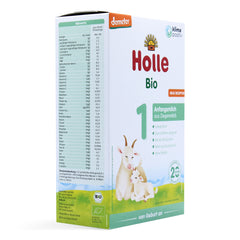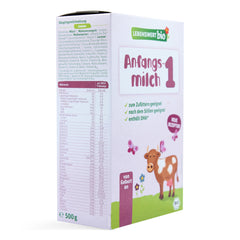7 Reasons to Use Organic Infant Formula
39 hours of research 4 minute read

Many parents prefer infant formulas for their little ones because of many benefits like schedule flexibility or convenience, but at the same time, they become increasingly aware of harmful ingredients, including artificial growth hormones, synthetic preservatives, and pesticides.
Will your child be happy and healthy with an organic formula? Let's explore the top 7 reasons why going organic is important.
What Does “Organic” Mean & How Does This Apply To Baby Formulas?
You might have seen the “European Organic” or “U.S. Organic” seal on the label of baby formula products. The organic badge is backed by the European Commission or USDA.
For a baby formula to have the “organic” label, the formula should contain at least 70% (European 95%) natural and organic ingredients.
By definition, baby formula is organic when it contains 95% ingredients without
- Synthesizers or preservatives
- Genetically modified organisms (GMOs)
- Chemical pesticides or fertilizers
- Potentially toxic substances
- Hormones or steroids
Organic Certifications You’ll See On Famous Baby Formulas
There are many organic formulas that have achieved organic certifications. Let’s take a brief look at some of these
1. USDA Certification
Many American infant formulas are certified organic from the U.S. Department of Agriculture (USDA) because these formulas are manufactured according to the USDA regulations. This means that the organic formula should be made with at least 70% natural ingredients grown in synthetic pesticide and fertilizer-free soil, but not necessarily all organic ingredients.
2. E.U. Organic Certification
Infant formula is E.U. organic certified when it uses more than 95% organic ingredients. Unlike the USDA organic certification, the E.U. Commission has more comprehensive regulations with more ingredients transparency. Furthermore, E.U. organic certified formulas have to follow stricter regulations to not use toxic substances. HiPP is a popular E.U. organic certified formula brand.
3. Demeter Certification (Organic ++)
Some European formula brands have achieved extra certifications to make their formulas highly beneficial to your baby. For example, Holle is the only formula that has achieved Demeter certification (beyond organic having the highest standards) by biodynamic agriculture. In Holle formulas, Demeter-certified milk is sourced from grass-fed cows biodynamic self sustained farms.
4. Bioland Certification
Another certification acquired by some European formulas like Lebenswert is Bioland certification. The standards of Bioland certification exceed that of the E.U. organic. For example, Lebenswert formulas are Bioland certified because their products come from a farm that solely produces them. Bioland standards are much stricter than those of E.U. organic but not as strict as Demeter.
What Is An Organic Formula Made Of?
Both organic and non-organic baby formulas share the same base ingredients that are required for your baby. The only difference is that organic formulas use ingredients farmed naturally without the use of chemicals.

For example, organic formulas are manufactured from milk sourced from grass-fed cows, and non-organic formulas are made with milk sourced from grain-fed cows. Some organic formulas use goat milk or soy-based proteins in case your baby can’t digest cow’s milk proteins or is lactose intolerant.
In addition, healthy nutrients and ingredients are used to formulate organic baby recipes with a nutritional profile almost the same as breast milk. These organic nutrients include DHA, ARA, essential fatty acids, vitamin D & E, choline, prebiotics, probiotics, and folic acid. Other organic formulas contain certain vitamins and minerals, such as iron (this is what most moms look for in an organic formula).
What’s Not Included In An Organic Formula?
Now that we’ve figured out what’s included in the organic formula, let’s take a look at what isn’t included in organic formulas
1. Carrageenan
Carrageenan is a seaweed additive used as a stabilizer in infant formulas to ensure that vital nutrients in formula remain mixed and do not sit in the bottom.
The use of carrageenan is prohibited in organic formulas because this seaweed additive, when used at higher concentrations (>2500 mg/L), affects infant growth and palatability.
2. Fructose
Most American baby formulas are infused with added sweeteners, such as high fructose syrup and corn syrup, which are also added in soft drinks. Organic formulas are never in favor of added sugars. Instead, they prefer natural sweeteners like lactose.
3. GMOs
Organic infant formulas never add ingredients that are neither genetically modified and engineered nor mixed with GMO ingredients.
4. Synthetic Preservatives
Synthetic preservatives are added in infant formulas to prevent the product from any spoilage. Some synthetic preservatives you should watch out for include lutein, lycopene, hexane, L-carnitine, and taurine. Organic formulas are free of artificial preservatives because they’re manufactured with all-natural, safe ingredients.
Popular Organic Baby Formulas
- HiPP Organic Formula
- HiPP UK Organic Formula
- HiPP Dutch Goat Organic Formula
- Hipp 1+ Years Organic Formula
- Hipp 2+ Years Organic Formula
- Holle Bio Organic Formula
- Holle A2 Organic Formula
- Holle Goat Organic Formula
- Holle Goat Dutch Organic Formula
- Lebenswert Organic Formula
- Kendamil Organic Formula
- Earth's Best Organic Formula
- Earth's Best Organic Sensitive Formula
- Earth's Best Organic Gentle Formula
- Happy Baby Organic Formula
- Happy Baby Organic Sensitive Formula
- Bobbie Organic Infant Formula
- Bubs Organic Formula
- Burt's Bees Organic Formula
- Simple Truth Organic Formula
- Similac Organic Formula
- Enfamil Organic Formula
7 Reasons You Should Choose Organic Formula
At Organic Life Start, we firmly believe that organic formula is the best thing you can give your little one for their healthy growth. Here’s why you should choose an organic formula
1. Organic Formula Is Free Of Growth Hormones And Agricultural Chemicals
Do you know why thousands of parents choose organic baby formula for their little ones? It’s because organic formulas have no growth hormones.
Infants and children cannot tolerate toxic substances and drugs because their digestive systems have not matured yet. Non-organic formulas contain artificial growth hormones, as well as pesticide residues. With organic formulas, you will rest assured that they do not contain any synthetic growth hormones.
2. Organic Formula Is Highly Nutritional
The main goal of formula feeding is to help your baby grow up healthy and strong by providing essential nutrients. Organic formulas contain the right blend of vitamins & minerals.
3. There Are No GMOs (Genetically Modified Organisms)
Do you know that a high percentage of non-organic formulas contain GMOs? Research has shown that GMOs can toxically affect a baby’s organs and systems. Fortunately, organic baby formula not only contains synthetic ingredients, but also you’ll find organic formulas to be GMO-free.
It’s good to know that organic formula is more natural and healthier and tastes more like breast milk. This allows your baby to get every nutrient essential for their growing body and mind.
4. You Won’t Be Giving Your Baby Any Unnatural Sugars Or Emulsifiers
Non-organic baby formulas use the following harmful emulsifiers
- Taurine
- L-carnitine
- Lycopene
- Nucleotides
- Hexane
As with emulsifiers, studies have found that infant gut biome and metabolic health can be disrupted with commonly permitted emulsifiers. The common emulsifier used in non-organic baby formulas is carrageenan.
Corn syrup and fructose are commonly found in non-organic infant formulas. Would you be satisfied by giving your little one the formula with lots of sugars?
With organic formulas, you will never see any sugars in disguise, emulsifiers, and harmful preservatives. In Europe, an organic formula must contain 30% of the carbohydrates from lactose (a naturally occurring sugar). This is the main reason why European organic formulas are preferred.
5. Organic Formula Is Gentle And Complete
Organic baby formula is manufactured with ingredients that resemble breast milk. It means a more natural formula without any artificial ingredients like processed sweeteners. Organic formula is easy and gentle on your baby’s digestive system, is highly digestible, and provides complete nutrition to your little one.
6. Organic Formula Supports Better Farming Practices
Besides taking care of your child’s overall health, the organic baby formula supports better farming practices, giving your child and the environment a more sustainable future.
Non-organic dairy farms are considered ecological disasters for polluting the environment, due to which cows lose their milking practices and suffer abusive conditions. Unlike large-scale non-organic dairy farms, organic baby formulas source their milk from smaller dairy farms with more ethical operations, meaning that organic dairy farms take care of animal welfare and their environment.
7. Organic Formula Is The Healthiest
With the organic formulas, the likelihood of infants developing any health complications is lower.
The Benefits of Organic Infant Formula
The benefits of the organic baby formulas can give you the peace of mind that you’re meeting your little one’s nutritional needs. The high-quality yet fewer ingredients contained in organic formulas are fine-tuned for your baby’s proper nutrition.
Are you looking for the best organic formula brand to support your baby’s health for the first year of their life? We’ve got you covered. Organic Life Start has stocked a wide range of European organic formulas, such as Holle, HiPP, Lebenswert, and Kendamil. Head to our collection for more information.











Cory -
I always worry about what’s really in baby formula, especially things like added sugars, GMOs, or synthetic preservatives. It’s overwhelming trying to choose the safest and healthiest option for my little one, especially when every brand claims to be the best. Reading this blog helped me feel more confident about looking into organic formulas like HiPP and Holle. I didn’t realize how many harmful ingredients are in some non-organic options. Does anyone else feel the same way?
Tricia -
I never realized that there were so many hidden ingredients in non-organic formulas like synthetic preservatives and emulsifiers. As a mom, I always assumed formula was safe across the board, but this blog really opened my eyes to the value of certified organic options. It’s reassuring to know that European organic standards are so strict, especially when it comes to GMOs and added sugars. I love that these formulas prioritize not only my baby’s health but also ethical farming practices. It’s given me peace of mind knowing I’m making a more informed and conscious choice for my little one.
Marisa -
I’d love to hear more about the differences between USDA and E.U. organic certifications and how they impact the quality of baby formulas. Are there any specific ingredients allowed in one certification but prohibited in the other? Additionally, I’m curious if there are any studies comparing the nutritional benefits of formulas with Demeter or Bioland certification versus standard organic formulas. How do these higher standards influence the overall health of infants? It would be great to get a deeper dive into how these certifications translate into real-world benefits for babies!